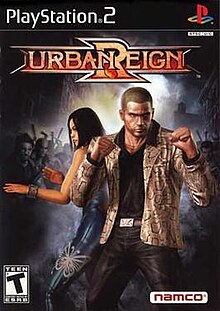
Mario Kart: Super Circuit is a 2001 kart racing game for the Game Boy Advance (GBA). It is the third Mario Kart game and retains its predecessors' gameplay: as a Mario franchise character, the player races opponents around tracks based on locales from the Super Mario platform games. Tracks contain obstacles and power-ups that respectively hamper and aid the player's progress. Super Circuit includes various single-player and multiplayer game modes, including a Grand Prix racing mode and a last man standing battle mode.
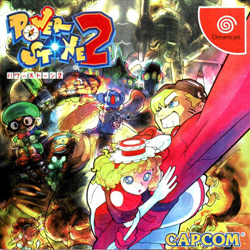
Power Stone 2 is a multiplayer fighting game that built on the innovative gameplay introduced by its predecessor, Power Stone. Power Stone 2 allows up to four players to choose from multiple characters and utilize items such as tables, chairs, and rocks in battle.

Tom Clancy's Splinter Cell: Pandora Tomorrow is a 2004 stealth game developed and published by Ubisoft Shanghai and Ubisoft Milan. The game is the sequel to Splinter Cell and the second game in the Splinter Cell series endorsed by writer Tom Clancy. It follows the covert activities of Sam Fisher, an agent working for a black-ops branch of the National Security Agency (NSA) called "Third Echelon". Michael Ironside returns to voice Sam Fisher, while Dennis Haysbert voices the character Irving Lambert, Fisher's boss, making this the only time he is not voiced by Don Jordan. Lalo Schifrin provides the theme music for the game.

It's Mr. Pants is a puzzle video game developed by Rare and published by THQ for the Game Boy Advance. It was released in North America in 2004 and Europe in 2005. A port of the game for mobile phones was developed and published internationally by In-Fusio in 2005–2006. The game stars Mr. Pants, a crudely drawn mascot formerly featured on Rare's website who had made cameo appearances in several prior Rare games.

Meteos is a 2005 tile-matching video game developed by Q Entertainment and published by Bandai for the Nintendo DS. It was produced by Q Entertainment founder Tetsuya Mizuguchi and designed by Masahiro Sakurai. Meteos was inspired by the video game Missile Command (1980), the film The Matrix (1999) and the television series 24 (2001-2010).

Lego Star Wars: The Video Game is a 2005 Lego-themed action-adventure video game based on the Lego Star Wars line of construction toys, and the first installment in the Lego video game franchise developed by Traveller's Tales, which would develop many future Lego titles from that point on. It was first released on 29 March 2005, and is a video game adaptation of the Star Wars prequel trilogy: The Phantom Menace, Attack of the Clones and Revenge of the Sith, with a bonus level from A New Hope.

Midnight Club: Street Racing is a 2000 racing video game developed by Angel Studios and published by Rockstar Games. The game focuses on competitive street racing and the import scene. Two distinct versions of the game were released for the PlayStation 2 and Game Boy Advance platforms, the former being a launch title for the platform. It is the first game in Midnight Club franchise, followed by Midnight Club II.

WWE SmackDown! vs. Raw 2006 is a professional wrestling video game and developed by Yuke's that was released on the PlayStation 2 and PlayStation Portable by THQ in 2005. It is part of the WWE SmackDown vs. Raw video game series based on the professional wrestling promotion World Wrestling Entertainment (WWE), and is the successor to the 2004 game of the same name. SmackDown! vs. Raw 2006 was also the first game in the series to be released on PlayStation Portable and the last game in the SmackDown!/SmackDown! vs. Raw series that was PlayStation exclusive.

Delta Force: Black Hawk Down is a first-person shooter video game developed by NovaLogic. It was released for Microsoft Windows on March 25, 2003; for Mac OS X in July 2004; and for PlayStation 2 and Xbox on July 26, 2005. It is the 6th game of the Delta Force series. It is set in the early 1990s, during the Unified Task Force peacekeeping operation in Somalia. The missions take place primarily in the southern Jubba Valley and the capital Mogadishu. The game also features a mission editor with which players can make custom missions. The game is based on the book of the same name, not the Sony film.
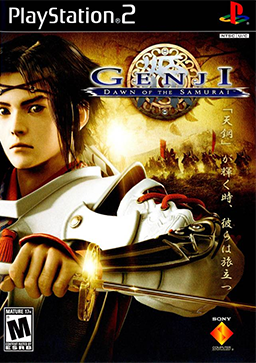
Genji, released as Genji: Dawn of the Samurai in North America, is a 2005 action-adventure video game developed by Game Republic and published by Sony Computer Entertainment for the PlayStation 2. It is loosely based on The Tale of the Heike. A sequel, Genji: Days of the Blade, was released for the PlayStation 3.
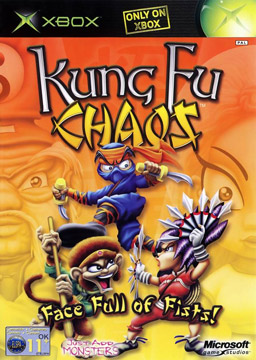
Kung Fu Chaos is a 2003 3D fighting party game developed by Just Add Monsters and published by Microsoft Game Studios for the Xbox.

Rockstar Games Presents Table Tennis is a 2006 table tennis simulation video game developed by Rockstar San Diego and published by Rockstar Games. The game is a realistic simulation of the sport table tennis, with the main objective to make the opponent fail to hit the ball.
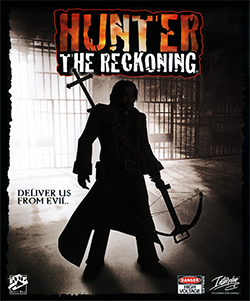
Hunter: The Reckoning is a 2002 hack-and-slash third-person shooter video game developed by High Voltage Software and published by Interplay Entertainment for the Xbox and GameCube. It is based on the tabletop role-playing game of the same name, and is part of the larger World of Darkness series. Two sequels, Wayward and Redeemer, were both released in 2003.

Frogger's Adventures: The Rescue is an action-adventure video game released in 2003 by Hudson Soft. It is based on the original 1981 Frogger arcade game, and contains similar hop-and-dodge style gameplay.

Starship Troopers is a first-person shooter game developed by British company Strangelite Studios and published by Empire Interactive. The game is based on the 1997 movie of the same name by Paul Verhoeven.

Downhill Domination is a racing video game developed by Incog Inc. Entertainment and published by Sony Computer Entertainment for the PlayStation 2. It was released in North America in 2003 and in Europe by Codemasters in 2004.

Dragon Ball Z: Budokai Tenkaichi, released in Japan as Dragon Ball Z: Sparking!, is a series of fighting games developed by Spike based on the Dragon Ball franchise by Akira Toriyama. The series was published by Namco Bandai Games in Japan and Europe, and by Atari in North America and Australia until 2008. Since the third game, Bandai Namco has handled Dragon Ball game publishing in all regions, effectively ending Atari's involvement.

Super Dodgeball Brawlers, originally released in Japan as Chō Nekketsu Kōkō Kunio-kun Dodgeball Bu is a dodgeball-based sports game released for the Nintendo DS.
God of War is an action-adventure game franchise created by David Jaffe and developed by Sony's Santa Monica Studio. It began in 2005 on the PlayStation 2 (PS2) video game console and has become a flagship series for PlayStation, consisting of nine installments across multiple platforms. Based on ancient mythologies, the series' plot follows Kratos, a Spartan warrior who becomes the God of War and comes into conflict with various mythological pantheons. The earlier games in the series are based on Greek mythology and see Kratos follow a path of vengeance against the Olympian gods; the later games are based on Norse mythology and see Kratos on a path of redemption while also introducing his son Atreus as a secondary protagonist, as they come into conflict or interact with various Norse deities and figures.

Teenage Mutant Ninja Turtles: Mutants in Manhattan is a 2016 hack and slash game developed by PlatinumGames and published by Activision. It is inspired by IDW Publishing's Teenage Mutant Ninja Turtles comic book series. It was released for PlayStation 3, PlayStation 4, Windows, Xbox 360, and Xbox One in May 2016. Less than eight months after its release, the game was removed from sale from all digital storefronts on January 3, 2017. This was the last Nickelodeon game to be published by Activision, with the rights for the Teenage Mutant Ninja Turtles video game series being given to Dotemu.
